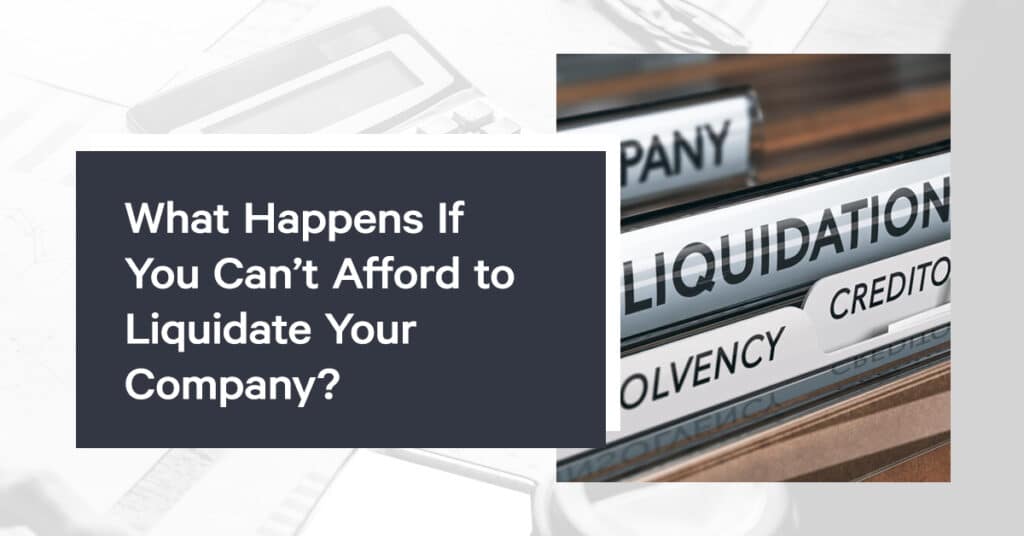When a business reaches the end of the road, liquidation often becomes the necessary next step. But what happens when the company is already insolvent, creditors are circling, and there’s no money left, not even enough to pay for the liquidation itself?
It’s an uncomfortable but increasingly common scenario. Directors are under pressure to act responsibly, yet the cost of liquidation can feel like a brick wall. If you’re in this position, you’re not alone. Many business owners across the UK are asking the same question: What are my options if I can’t afford to liquidate my company?
Let’s break it down.
Why You Can’t Just Walk Away
One of the biggest misconceptions among company directors is that when things get bad enough, they can simply shut the doors and walk away. Unfortunately, it’s not that simple.
If your company is insolvent, meaning it can’t pay its debts when they fall due, you have a legal duty to act in the best interests of creditors. Ignoring this obligation can result in serious consequences, including personal liability, disqualification as a director, or even allegations of wrongful trading.
Liquidation is the process designed to deal with insolvency properly. But what if you’re staring at a quote of several thousand pounds for a formal Creditors’ Voluntary Liquidation (CVL) and thinking: We don’t even have that in the bank…
Why Liquidation Still Costs Money
Even when a company has no money left, liquidation is a professional legal process and must be conducted by a licensed insolvency practitioner. They handle creditor claims, employee redundancies, statutory reporting, and investigations into director conduct.
In most cases, their fees are paid out of company assets. But if there are no assets, or they aren’t worth enough to cover the costs the directors may be asked to contribute personally. This is where things can get tricky.
What Are Your Options?
If the standard quotes for liquidation seem out of reach, you do still have options. Some of them may surprise you:
1. Explore Low-Cost Liquidation Options
Not all firms charge sky-high fees. A number of reputable insolvency practices now specialise in low-cost liquidation, especially for small businesses or companies with few assets. These services are often streamlined, transparent, and designed to support directors who are trying to do the right thing but are limited by cost.
It’s crucial to choose a provider who is properly licensed, not a broker or lead generator, as they’ll be the ones handling the process from start to finish.
2. Use Company or Director Redundancy
If you’ve been on the payroll (even as a director), you may be entitled to redundancy pay, holiday pay, and unpaid wages via the Redundancy Payments Service (RPS). These funds can sometimes be used to cover the cost of the liquidation itself, especially when working with an insolvency practitioner who can advise on eligibility and process.
This isn’t widely known but can be a lifeline.
3. Look at Payment Plans
Some insolvency firms will allow directors to pay their liquidation costs in instalments, especially if they can see you’re committed to acting responsibly. It’s always worth asking, especially if you’re worried about being personally liable.
4. Asset Sales or Third-Party Help
In some cases, there may be assets the company has overlooked: small pieces of equipment, customer lists, websites, or intellectual property. Alternatively, a director or third party might be able to purchase those assets, releasing funds to cover the liquidation costs in the process.
This must always be handled properly and transparently, with valuations if needed, but it can be a legitimate way forward.
What Happens If You Do Nothing?
If a company is insolvent and you don’t act, you expose yourself to legal and financial risks:
- Creditors may petition to wind up the company forcibly, which could lead to less control and higher costs.
- You might face disqualification as a director for failing to act.
- You may be made personally liable for some debts if wrongful trading is proven.
- HMRC may take enforcement action, especially if VAT or PAYE is owed.
Inaction only increases stress and risk. While it may feel like you’re buying time, it often leads to worse outcomes for both directors and creditors.
Doing the Right Thing Doesn’t Have to Break the Bank
The good news? It is possible to liquidate a company affordably and professionally. Low-cost liquidation services exist for exactly this reason to help directors fulfil their duties without being financially crippled in the process.
Even if you’re unsure about your next steps, talking to a licensed insolvency practitioner can provide clarity. The conversation is usually free, confidential, and tailored to your situation.
Talk to the Right People: Simple Liquidation
If you’re concerned about the cost of liquidation and don’t know where to turn, Simple Liquidation is here to help. We specialise in low-cost liquidation for directors who need a reliable, professional solution, without the pressure or upselling of brokers.
Our licensed insolvency practitioners have over 30 years of experience and are members of both the Insolvency Practitioners Association and R3. We’ll walk you through your options, support you with any claims you may be entitled to, and handle the entire process from start to finish.
Reach out today for a no-obligation conversation and take control of your company’s future responsibly.

